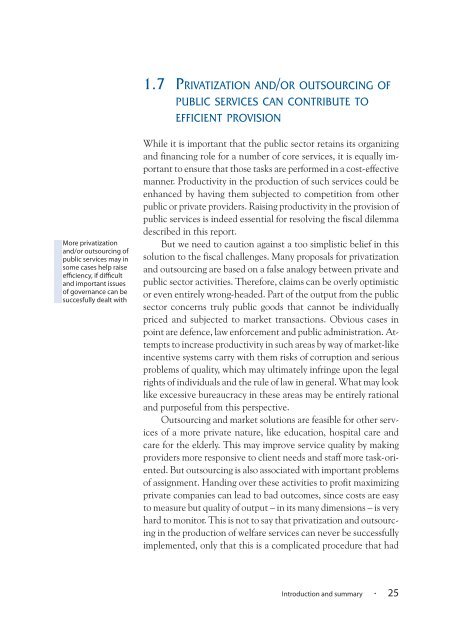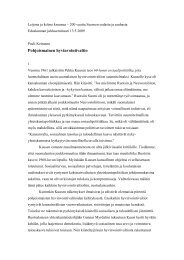The Nordic Model - Embracing globalization and sharing risks
The Nordic Model - Embracing globalization and sharing risks
The Nordic Model - Embracing globalization and sharing risks
Create successful ePaper yourself
Turn your PDF publications into a flip-book with our unique Google optimized e-Paper software.
1.7 PRIVATIZATION AND/OR OUTSOURCING OF<br />
PUBLIC SERVICES CAN CONTRIBUTE TO<br />
EFFICIENT PROVISION<br />
More privatization<br />
<strong>and</strong>/or outsourcing of<br />
public services may in<br />
some cases help raise<br />
efficiency, if difficult<br />
<strong>and</strong> important issues<br />
of governance can be<br />
succesfully dealt with<br />
While it is important that the public sector retains its organizing<br />
<strong>and</strong> financing role for a number of core services, it is equally important<br />
to ensure that those tasks are performed in a cost-effective<br />
manner. Productivity in the production of such services could be<br />
enhanced by having them subjected to competition from other<br />
public or private providers. Raising productivity in the provision of<br />
public services is indeed essential for resolving the fiscal dilemma<br />
described in this report.<br />
But we need to caution against a too simplistic belief in this<br />
solution to the fiscal challenges. Many proposals for privatization<br />
<strong>and</strong> outsourcing are based on a false analogy between private <strong>and</strong><br />
public sector activities. <strong>The</strong>refore, claims can be overly optimistic<br />
or even entirely wrong-headed. Part of the output from the public<br />
sector concerns truly public goods that cannot be individually<br />
priced <strong>and</strong> subjected to market transactions. Obvious cases in<br />
point are defence, law enforcement <strong>and</strong> public administration. Attempts<br />
to increase productivity in such areas by way of market-like<br />
incentive systems carry with them <strong>risks</strong> of corruption <strong>and</strong> serious<br />
problems of quality, which may ultimately infringe upon the legal<br />
rights of individuals <strong>and</strong> the rule of law in general. What may look<br />
like excessive bureaucracy in these areas may be entirely rational<br />
<strong>and</strong> purposeful from this perspective.<br />
Outsourcing <strong>and</strong> market solutions are feasible for other services<br />
of a more private nature, like education, hospital care <strong>and</strong><br />
care for the elderly. This may improve service quality by making<br />
providers more responsive to client needs <strong>and</strong> staff more task-oriented.<br />
But outsourcing is also associated with important problems<br />
of assignment. H<strong>and</strong>ing over these activities to profit maximizing<br />
private companies can lead to bad outcomes, since costs are easy<br />
to measure but quality of output – in its many dimensions – is very<br />
hard to monitor. This is not to say that privatization <strong>and</strong> outsourcing<br />
in the production of welfare services can never be successfully<br />
implemented, only that this is a complicated procedure that had<br />
Introduction <strong>and</strong> summary · 25

















